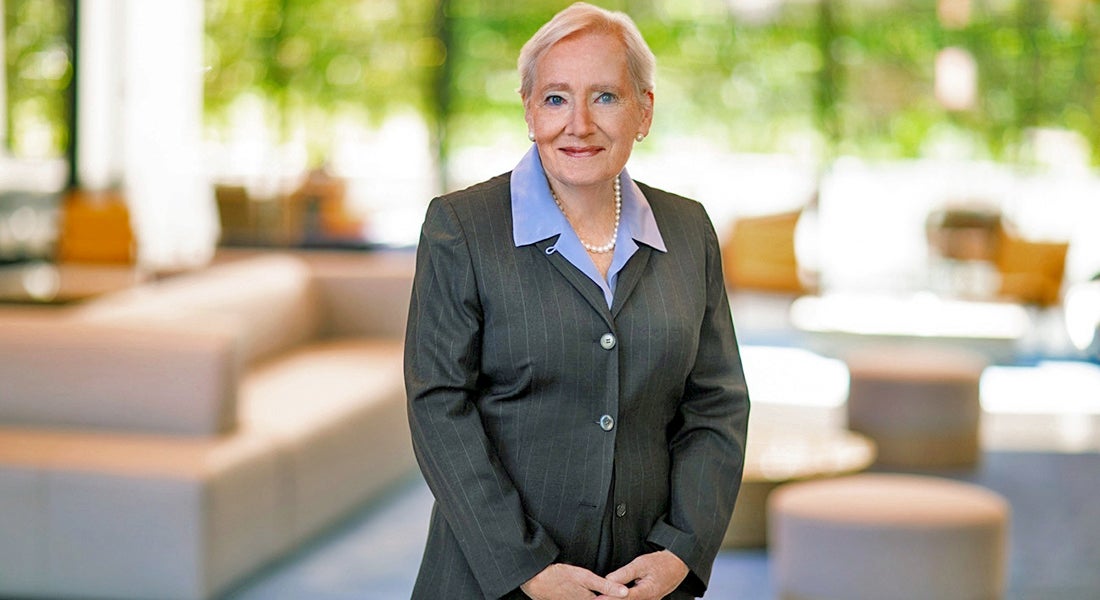A Career of Uncommon Decency
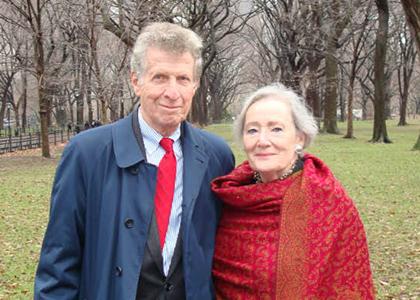
When Dorothy Wolpert ’76 started at UCLA School of Law, she wasn’t the typical new student. Nearing 40, she had just celebrated her 20th wedding anniversary and she was the mother of 10- and 13-year-old boys.
But it wasn’t the difference in age or experience that made Dorothy stand out. It was her wit, intelligence, charm, and passion. With those qualities, and her husband Stanley—already a successful UCLA history professor —at her side, she forged a career in law of uncommon decency and service.
At the Beginning: A Most Uncommon Law Student
It had always been her dream to be a trial attorney. “Law involved three things that I loved,” recalls Wolpert today. “Research, writing, and talking. To me being a lawyer meant being a litigator.”
As so often happened to women then, as now, life initially got in the way of her pursuit of that dream. A New York City native, she met Stanley Wolpert while she was a freshman at City College in New York. They soon married and moved to Pennsylvania so he could pursue his PhD at the University of Pennsylvania. Dorothy continued her own studies at Penn but the couple soon found themselves moving to India for Stanley’s work.
It was an experience soon after, while just a few credits shy of her college degree, that persuaded her a dream of law was possible. Stanley received an offer from UCLA and they moved to Los Angeles.
“I then had an epic battle with Penn and won,” says Wolpert. “And contrary to the odds! I wrote to them to say, ‘it is highly unlikely that I should ever return to Philadelphia as a student.’ And they wrote back, ‘We do not award degrees except to seniors in residence.’ I wouldn’t accept that and badgered them until they conceded.”
Was it persuasion or persistence that won the day?
“Oh, I definitely wore them down,” Wolpert laughs.
After completing her final credits at UCLA to get that degree from Penn, she took the LSAT and prayed for acceptance to UCLA Law. “It was the only viable option,” she says. “We couldn’t afford USC and I couldn’t leave town.”
At the law school, she learned from UCLA Law legends, including Professors Kenneth Karst, Gary Schwartz, Mel Nimmer, Jesse Dukeminier, Dick Maxwell, and David Binder, among others.
One of the signal features of her law school days was the unconditional support she received from Stanley, whose career was taking off as he introduced groundbreaking classes on India and transformed the UCLA History Department’s approach to teaching the political and social histories of non-European countries and regions.
“The way he pivoted from being a rather coddled, bourgeois husband to learning how to cook and driving carpool while I went to law school was remarkable,” says Wolpert. “He did it with grace, and seamlessly, and he walked me to school every day and carried my books.”
Starting As a Law Firm Associate
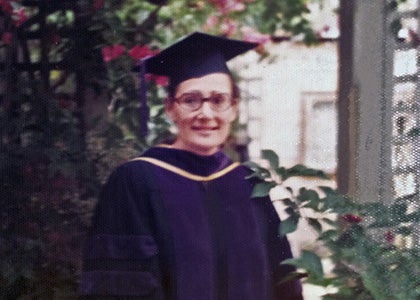
Though an excellent student, being older, and a mother, meant finding a job was no easy task. She received so many letters that began, “We regret to inform you…” that Stanley joked, “I am going to print up cards that say ‘It’s your loss’ to send back to them.”
But she didn’t let these letters slow her down. Realizing her traditional résumé wasn’t working, she developed a new strategy: humor. She wrote a letter introducing her experiences prior to law, including balancing a family with a career, as unique skills that could benefit a law firm and included her date of birth with “(sic)” after it, even though the date was not a typo.
Recalls Wolpert: “One young man interviewing me shyly asked, ‘Do you think that you will be able to take instruction from people younger than yourself?’ ‘Absolutely,’ I said. ‘I have teenage children—I do it every day!”
Her unorthodox approach landed her a position at the leading entertainment law firm of the day, Kaplan, Livingston, Goodwin, Berkowitz & Selvin, with clients including 20th Century Fox, United Artists, Orson Welles, and Ava Gardner.
Kaplan Livingston also had a commitment to public service which was transformative to the new associate.
Partner Bayard Berman’s pro bono leadership on the landmark case desegregating Los Angeles’ Schools, Crawford v. Los Angeles Board of Education, made a deep impression. It was the most important desegregation case since Brown vs. Board of Education.
“I think I was hardwired for that kind of work,” says Wolpert. “I came from a lower middle-class background, and I was very aware of privilege versus want. It always seemed right to me to be concerned about those things.” Working on Crawford, combined with her law school experiences in David Binder’s trial advocacy courses, cemented her commitment and led to decades of service through pro bono work and volunteer positions.
Founding a Law Firm
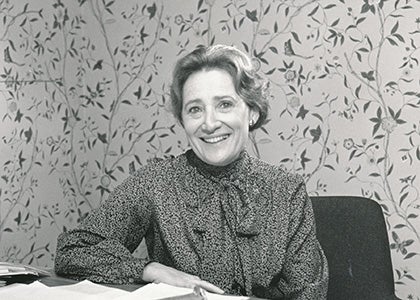
In 1981, Wolpert joined four other lawyers and founded the firm now known as Bird Marella Boxer Wolpert Nessim Drooks Lincenberg & Rhow.
The founding partners of Bird Marella decided to focus exclusively on litigation and quickly developed a lasting reputation. In time, Wolpert argued before the California Supreme Court, all the U.S. district courts in the state, and the Ninth Circuit, on issues such as copyright infringement, entertainment law, and transportation law. She has been honored as a California Litigation Star and one of the Best Lawyers in America.
The new firm also made a commitment to maintaining a work-life balance for all its attorneys, a concept that wasn’t common anywhere in the go-go environment of the 1980s, much less among law firms. “One thing that indicates that we did it right is the number of children at our law firm,” says Dorothy. “We believed that even lawyers should live balanced lives.”
Mark T. Drooks, a principal at Bird Marella, agrees. “Dorothy and the other founding partners had built that balance into the fabric of the firm. For example, for many years, young lawyers did not receive any reports on their hours; the message from the firm was that they should get their work done, well, and not worry about meeting a particular target for revenue or time spent in the office.”
Serving the Public Interest
It was with Drooks that, in 1996, Wolpert worked on a case that helped free over 70 Thai nationals who were working in conditions of slavery in a makeshift garment factory made up of residential duplexes in El Monte, California. The case is credited as beginning the anti-trafficking movement in the United States and led to numerous state and federal laws to address trafficking and poor labor conditions.
Drooks, who served as lead counsel in that case, recalls Wolpert’s powerful example.
“The defendants in that case demanded to depose each of our roughly 120 clients,” says Drooks. “That was going to involve an extraordinary commitment of time and a logistical nightmare. Instead of objecting, Dorothy rounded up all the associates at the firm, parceled out the defense of the depositions, and invited the defense lawyers to knock themselves out. The lead lawyer for the other side later admitted that moment was when they knew they were in trouble.”
While the El Monte Thai Worker Slavery Case is perhaps the most famous of Wolpert and Bird Marella’s pro bono cases, there have been more than a hundred such cases that she and her partners have pursued, all of them deeply meaningful to the clients and communities they supported.
Wolpert’s commitment to, as she calls it, “direct service,” led her in time to volunteer with non-profits in Los Angeles, including the Inner City Law Center, or ICLC. She has since donated many hours to the center and its clients in pursuing justice for low-income tenants, working poor families, homeless veterans, and others.
ICLC was founded by UCLA Law alumna Nancy Mintie ’80. Wolpert is such a believer in its mission that she has served as a member of its Board of Directors since 1998 and as its President from 2001 to 2003. In 2004, she received the center’s Katherine Krause Award for Public Service.
Jim Barrall ’75, who admired Wolpert when they were law students together, has served on the ICLC’s Boards of Directors and Advisors with her since 2006. “I’ve never known any private sector lawyer who is more committed to fighting for justice and serving the under-served, than Dorothy,” says Barrall. “She is truly a force of nature.”
Adam Murray, the ICLC's chief executive officer, agrees. “Dorothy is fabulous in every dimension,” says Murray. “Serving as Board President, creating our annual fundraising event, being our top fundraiser, taking on our pro bono matters and housing litigation. She achieved our largest settlement ever against a slumlord.”
Murray is referring to a case in which Wolpert and other attorneys from the center obtained a settlement of over $6 million on behalf of over 100 tenants, many of whom were children, living in Los Angeles apartment building plagued by years of multiple housing code violations and squalor. The tenants had also endured harassment, discrimination, and retaliation from the landlords and owners. The settlement proceeds were distributed among the tenants and college annuities established for the minors. The attorney fees from the victory were donated back to the center.
Murray again: “Dorothy always asks, ‘How will this serve the people who depend on us?’ and ‘Will this enable us to serve more people?’”
Wolpert is pragmatic. “Life is short, and one person can only do very little,” she says. “But if you can keep a family from becoming homeless and provide them with decent housing and some money to feed their children and school them, then you've accomplished something that's real. It doesn't change the world, but it's real.”
“Considering the absurd age I've reached, I guess I still have a lot of energy! When I decide to do something, I put that energy into it, wanting it to be the best I can get, and you don't always know the limit.”
A Very Special Partnership
Wolpert attributes all the success she’s enjoyed to the success of her marriage. “It was always a partnership, everything we did,” she says.
“They were manifestly in love,” observes Drooks. “One could not see Dorothy and Stanley together without understanding that fact implicitly. And they were generous in all things without any interest in projecting an image of power or prestige. I suspect they were far too confident for that.”
The Wolperts were married for over 65 years, until Stanley’s death in 2019.
“Stanley's contribution to the university and the world exceeded anything I could ever imagine,” says Wolpert. “He taught thousands of students over many, many years and his contributions were incalculable.”
Stanley had become chair of the History Department at UCLA and won the Distinguished Teaching Award while Dorothy was in law school. His teaching career spanned six decades, including time in a vice chancellorship and starting what is now the Honors program in the UCLA College of Letters and Science. In 1992, he was awarded the UCLA Distinguished Service Award.
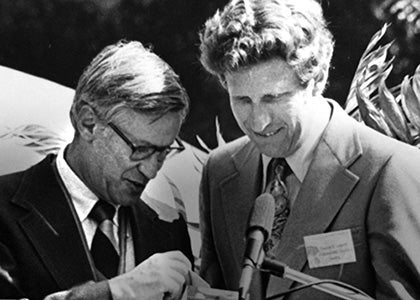
“One might say Stanley was the foreign minister of UCLA,” says David Myers, director of the UCLA Luskin School of Public Affairs’ Center for History and Policy, and a longtime colleague. “A global traveler known and welcomed in many world capitals and beloved in the History Department.”
Stanley Wolpert was one of the world’s leading experts on South Asia, authoring award-winning books on India and Pakistan. “He was a scholarly giant,” continues Myers. “He was at once friendly with prime ministers and yet iconoclastic enough to have his work banned in both India and Pakistan. That was a measure of his fair-mindedness and influence.”
Stanley also wrote four novels, one of which was made into a film.
Together, the Wolperts built a warm and intellectually engaging community, known for having students, colleagues, faculty, and interesting people over for delicious Indian food, cooked by Dorothy, at their Westwood home.
The couple had two children and three grandchildren, and Wolpert expresses some disbelief that she’ll soon be a great-grandmother.
That won’t slow her down, though. She continues to work, continues to volunteer at the Inner City Law Center, still finds time to mentor lawyers and UCLA Law students, and participates in UCLA Law Women LEAD, a network of alumnae.
For all these commitments, so many of them ongoing, UCLA Law is honoring Dorothy with a U. Serve L.A. award on April 13, 2022, and establishing the Dorothy and Stanley Wolpert Public Interest Law Fellowship to provide financial support to UCLA Law students who work for the Inner City Law Center.
“Dorothy represents the best of UCLA School of Law,” says Dean Jennifer L. Mnookin. “She’s an exceptional lawyer dedicated to pro bono work who has taken the time to support generations of students and lawyers who have followed. The school is rightly proud of her and all she’s done, and I am fortunate to call her a friend.”
Wolpert is humbled by the attention of the award and fellowship. “There are so many people in this city who do good work and care about this community and our fellow humans,” she says. “To the extent that this is any kind of acknowledgement of me, I think it's really an acknowledgement of everyone who does this work, especially at the Inner City Law Center. Those who do this day in and day out are the true heroes.”
